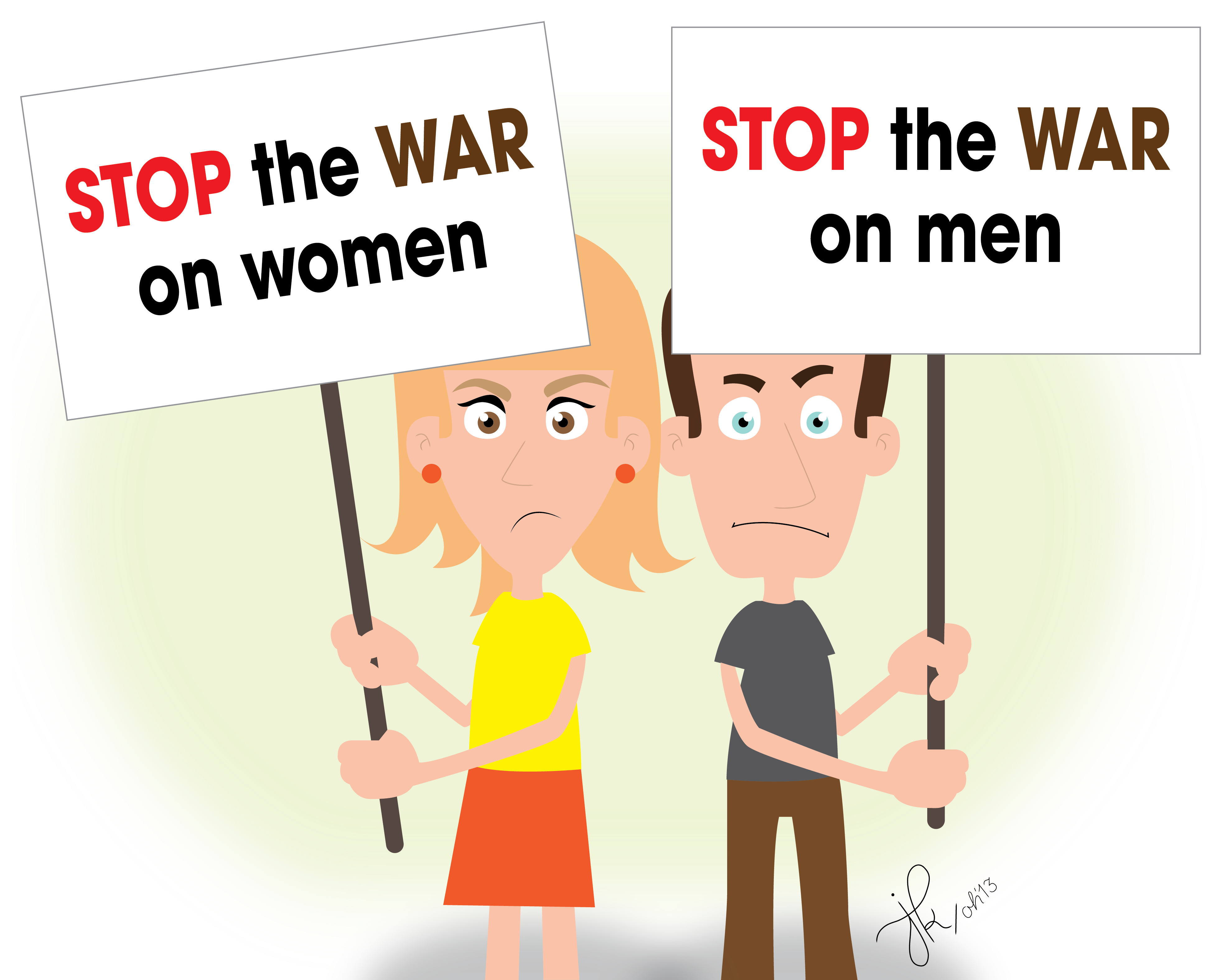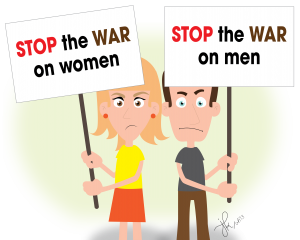“Theft isn’t black, bank fraud isn’t Jewish, and rape isn’t male. Just because you’re paid to demonize men doesn’t mean rape is gendered.” These words accompanied posters put up by the newest chapter of a Men’s Rights Group in Calgary.
The posters were reported by members of the University of Alberta’s student union, and began to appear on social media on Sept. 16. They also featured a portrait of Lisa Gotell, chair of the Women’s Studies department at UofA, labeled as a ‘bigot.’
Though this happened at a university, it would be naïve to dismiss the issue as something that is only happening on campuses.
According to Julie Michaud, the Administrative Coordinator at Concordia’s Centre For Gender Advocacy, the fact remains that rape culture is deeply ingrained in our society. “Rape culture is a term that sounds quite inflammatory. When we hear it we may feel like it’s an exaggeration,” she said.“We realize there are a lot of attitudes and explicit messages that tell us that rape is normal, and not that big of a deal. We’re told people who are making a big deal out of it are just being over sensitive.”
The problem with men’s rights advocates is not that they wish to talk about issues such as men’s access to rape and sexual assault counselling, it’s that they do so in a way that disparages feminism and anti-sexual violence work. Their words are less rooted in justice, and more in blaming the victim.
They ignore the fact that feminist discourse shows an understanding that these issues do not only affect women. This comes from a profound and intentional lack of understanding of feminism, which according to Michaud, is in part gained from media and popular culture, which paints women as “almost cartoonish, man hating feminists.”
For groups like Men’s Rights Calgary to insinuate that droves of women are lying about being sexually assaulted or raped is not only ignorant, it’s downright false. There are no statistics to support any assertion that women are lying about rape. In fact, the most popular study often cited by men’s rights advocates, which claimed that a staggering 41 per cent of rape claims made to the United States police over almost a decade were false, has since been completely debunked, according to The Huffington Post.
The rhetoric being thrown around by these groups is also dangerous; it normalizes the idea of rape and sexual assault. This victim blaming is part of the problem. We need to teach men not to rape, not teach women how to avoid being raped.
According to Michaud, it can start with more education. “I think we need consent workshops with as many students as we can. I think campaigns like the ‘Don’t Be That Guy’ campaign are very effective because they show in a really clear way, that having sex with somebody who’s too drunk, or passed out, or who changes their mind once some kind of sexual activity has started… that those things are all sexual assault.”
Despite the good intentions of campaigns like ‘Don’t Be That Guy’ Michaud believes they are not enough. She believes open discussions and workshops on the issue are important.
There remains plenty of evidence that rape culture is silencing women about their experiences with sexual assault. According to the Rape, Abuse, and Incest National Network, out of every 100 rapes that occur in the United States, only 46 are reported to police. Only three out of those 100 cases end in conviction. Those numbers point to a serious problem.
This is why it’s so important to have places like the Centre for Gender Advocacy, and the Sexual Assault Centre, which has long been fought for and is finally going to open this year.
At a time when a culture of rape runs rampant, and men’s rights groups look to undermine the work to end sexual violence and violence against women in general, it is our job to be vocal about these issues and to get involved as much as we can.






Here’s a new thought: if you don’t know the woman well enough to know if she will accuse you of rape, don’t have sex with her. Seriously — your reputation and criminal record won’t take a hit. You’ll just be branded as a gentleman. Is that so bad?
I would never ask you that question. You’re blaming the victim.
I don’t follow. Do you mean is it so bad to be a gentleman? Who’s the victim you say I’m blaming. Sorry — I’m not trying to be obtuse. I just don’t understand the point you are making.
I think you are saying that a man shouldn’t place himself in the kind of situation where he might be subject to a false allegation? Men sometimes make similar claims about women who are victims of sexual assault (e.g., don’t dress provocatively to avoid the attention of sexual predators, etc.). Although the two situations are not symmetrical (a minority of allegations of sexual assault are false), I think they are both equally wrong for the same reason. Women should be protected from sexual assault. Men having consensual sex (regardless of circumstance) should be protected from false allegations.
Oh, I get what you are saying. I should have been more clear. I just mean that sometimes it’s good to just walk away. I have always been grateful to those fellows who were decent to me when I was a silly, inebriated young woman. I bet there are many like them but they get missed in the general discussion.
I believe, and I suspect feminists believe, that the majority of men do not rape — give in — take advantage — whatever label is put on it. This should not be a war against the sexes but a general agreement that it is bad to blame people if they are innocent.
I guess our main disagreement is that something can’t be considered “consensual” if there are “circumstances”. I’m reading “circumstances” these “blurred lines” I hear about. But two wrongs rarely make a right no matter how you look at it. That’s all I’m getting at.
This is a very difficult issue. I might approach the topic differently, though. It seems to me that the issue isn’t so much about women making false rape allegations per se… I think it might have more to do with the problem that false rape allegations sometimes happen (the exact statistics are irrelevant) because certain mechanisms have been put in place to encourage women who have actually been raped to step forward. This is not necessarily a bad thing. What isn’t good, though, is the way these mechanisms are implemented. The fact that a man’s life will be fundamentally changed for the rest of his life by a false rape accusation (even if it is proven false) means that something must change. Feminism now yields political clout (hence the reason why these protective measures exist); yet we mustn’t overlook the difference between feminism as an institution (such as the invested interests of a women’s studies department) versus feminism as an ethics. The existence of every institution is inseparable from considerations of power (oppression in Foucault’s sense of the term). So, when men’s rights advocates label feminism as the enemy, I think in many cases they are speaking about the political interests of feminism that resist the kind of change they would like to see happen. That is, I suspect men’s rights advocates see eye to eye with feminists about rape … They just don’t want to loose their own rights in the process.
What makes you think that the reason sex crimes became an issue is a direct result of feminism? There are many factors in our recent history that have contributed. One of the fundamental feminist principals is that our society is run by middle-age, christian-leaning white men. That being the case, perhaps these same men were distraught enough when their own daughters were raped that they started to see how the laws needed to be changed. I could only wish to see, in my lifetime, women having equal enough power to men in this society that they did directly shape law.
I want women to have the same status as men too. And when did I suggest sex crimes became an issue as a direct result of feminism?
Robin, I really don’t care what gender you are. Having a penis won’t make your points any more valid. Every single point you make is regurgitation of feminist doctrine that has no factual bases. It isn’t lack of understanding on our part, that preposterous. It is disagreement on fundamental levels. A victim-point perspective derives satisfaction from being constantly under assault. That is the state of feminism. There are women’s rights issues and there are men’s rights issues. Both are valid. Feminism represents none. It has failed women and subjugated men. MRM is rational response to emotionalism of ‘trigger warnings’ rape hysteria and misandry. It represents both sexes equally. Yes there are perpetual victims in MRM but this stems from lack or legal representation and overwhelming volume of feminism. Reexamine both movements in detail and make your conclusions based on facts, not feelings.
p.s
I suppose editors who come up with the title restrict replies as well. Curious…
Farewell.
Poor Ivan. Not getting consensually laid? Bummer.
Title it self exposes your gynocentric bias. One does not have to get far to realize this is the usual silencing attempt. No feminists don’t get the monopoly in the discussion of gender issues. Not if you want equality. You do want equality don’t you?
And no you don’t get to blame MRAs for desensitization of society to rape. That’s on you. You’ve been crying wolf too many times, not MRAs. We just realized how feminists use rape hysteria to silence men and isolate them from the discussion.
-_-
The problem I have with this article is mentioning the MRA cited 41% false allegation statistic as being debunked. But then rely on the RAINN statistic that only 3% of rape cases end in conviction, which has also been debunked.